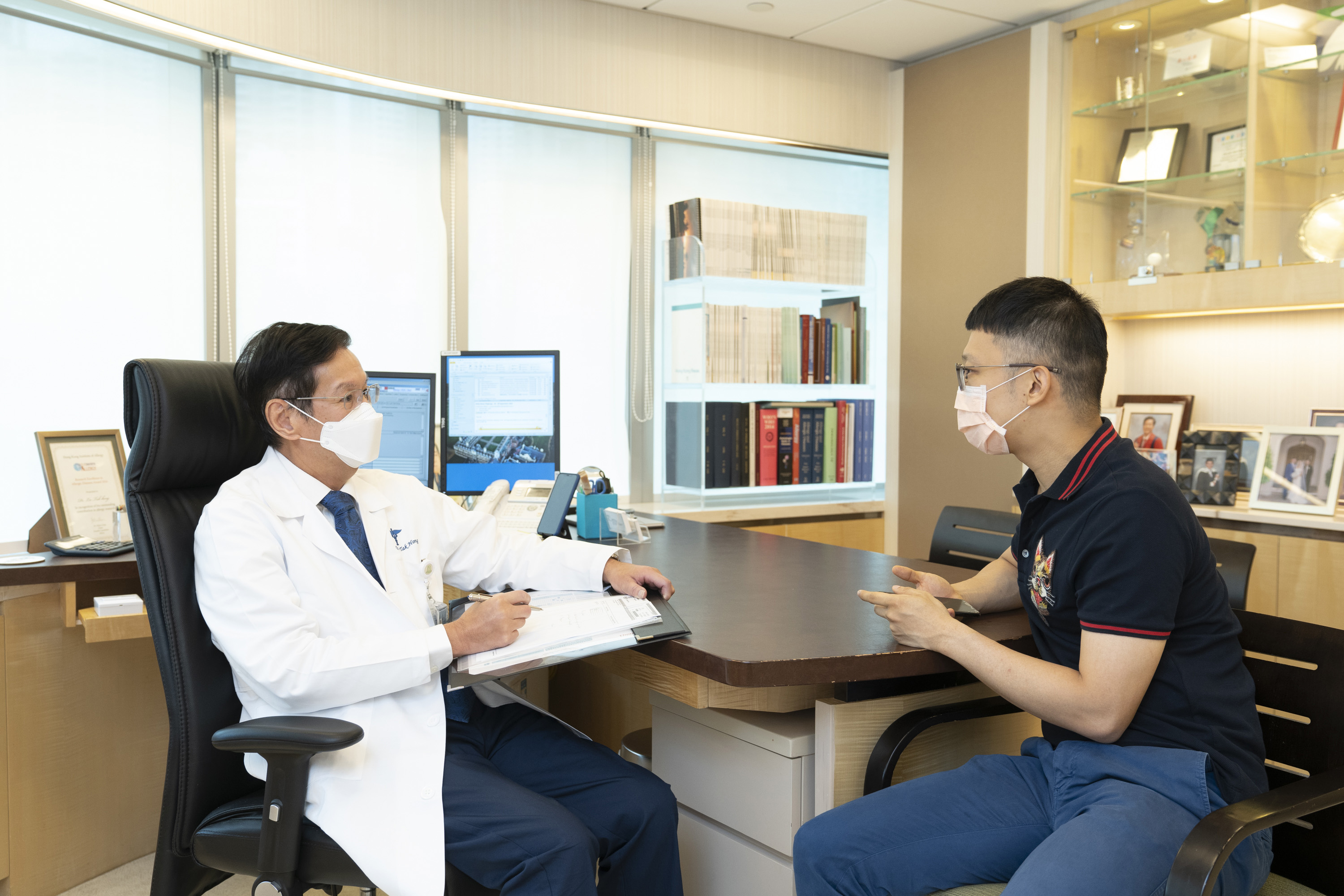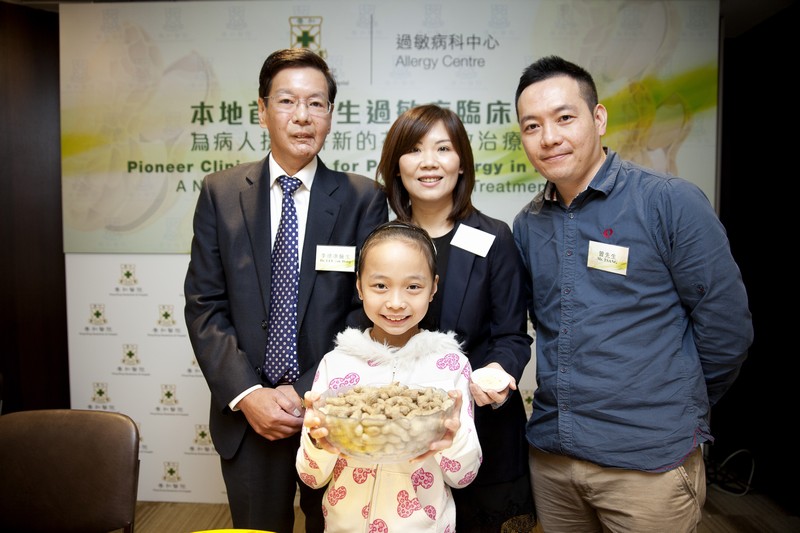
Research
|
16 February 2022 |
HKSH-HKU Joint Study: Nearly 98% of the First Batch of People with History of Allergies Screened by VAS Clinics were Eventually Recommended for Vaccination (16 February 2022, Hong Kong) A recent study by Hong Kong Sanatorium & Hospital (HKSH) and LKS Faculty of Medicine, The University of Hong Kong (HKUMed) reveals that 98% of the allergic patients previously deemed to be at risk of COVID-19 vaccine-associated allergy were recommended for vaccination after allergist evaluation at Vaccine Allergy Safety (VAS) clinics between February and June 2021. The research team found that COVID-19 vaccination has been proven to be safe for patients who were previously deemed at higher risk of vaccine-associated allergic reactions. Unnecessary referrals for VAS screening would cause long waiting time for assessment and delays in vaccination. They also advised the concerned authorities the pressing need to reform the workflow of suspected COVID-19 vaccine-associated allergies including updating the current Hong Kong Institute of Allergy (HKIA) and Department of Health (DoH) guidance to remove non-COVID19 vaccine (or related excipient) associated anaphylaxis as a precaution for COVID-19 vaccination. Please click here for more information. |
10 November 2020 |
HKSH Allergy Centre Develops a Clinical Framework for Effective Use of Biologics in Severe Asthma and Allergic Diseases (10 November 2020, Hong Kong) Hong Kong Sanatorium & Hospital’s Allergy Centre recently published an evidence-based research review on the application of biological therapies (biologics) in allergic diseases in Asian Pacific Journal of Allergy and Immunology. Dr. Tak Hong LEE, Director of Allergy Centre and the principal author of the paper, together with colleagues from Canada and the UK, proposed a pragmatic framework to facilitate day-to-day patient care by helping medical practitioners to select the optimal biologic(s) to use in patients with severe asthma. The research suggested that the launch of new biologics will revolutionise the treatment of allergic diseases and herald an unprecedented era of personalised medicine. Please click here for more information. |
31 December 2019 |
HKSH Announces Pioneering Research Findings on Immunotherapy for Co-morbid Allergic Conditions (31 December 2019, Hong Kong) A two-year pioneering research study on the effectiveness of Allergen Immunotherapy (AIT) on co-morbid diseases was conducted by Allergy Centre of Hong Kong Sanatorium & Hospital (HKSH) with findings published in the international medical journal Immunotherapy in November 2019. A total of 120 patients with house dust mite-induced allergic rhinitis joined the treatment programme under this Study. Results showed that AIT could remarkably reduce the symptoms of allergic rhinitis by over 50% while also effectively relieving other co-morbid allergic conditions including asthma, conjunctivitis and atopic dermatitis (or eczema). As the first clinical study on AIT in Hong Kong, the Study is also an international first that focuses on the effectiveness of AIT for co-morbid allergic diseases. Please click here for more information. |
| 10 June 2019 |
Hong Kong Sanatorium & Hospital's Allergy Centre New Desensitisation Treatment for Peanut Allergy is Effective and Safe (10 June 2019 - Hong Kong) — A multi-year retrospective study since 2014 conducted by Hong Kong Sanatorium & Hospital’s Allergy Centre has continued to prove that the Desensitization Treatment for Peanut Allergic Patients with the use of a combination of anti-IgE with oral immunotherapy (OIT) is effective and safe. To date, 27 patients aged 6 to 16 years old have been treated with this combination therapy at the Hong Kong Sanatorium & Hospital’s Allergy Centre and the results are reported in the June 2019 issue of the Hong Kong Medical Journal. Please click here for more information. The research article “Peanut allergy and oral immunotherapy” was published in the Hong Kong Medical Journal. https://www.hkmj.org/abstracts/v25n3/228.htm |
| 23 January 2018 |
HKSH launches EASE (Eating Allergens Safely & Early) Hong Kong’s first food allergy prevention programme (23 January 2018, Hong Kong) Hong Kong Sanatorium & Hospital has launched “Eating Allergens Safely & Early (EASE) Programme” in January 2018, in light of the increasing concerns of parents on food allergy. EASE Programme is Hong Kong’s first food allergy prevention programme which helps parents to introduce allergenic foods to their high-risk infants for allergy at around 6 months of age to prevent future development of food allergy. Please click here for more information. |
16 April 2014
|
HKSH Pioneer Clinical Study for Peanut Allergy in Hong Kong - A New Customized Desensitization Treatment for Peanut Allergic Patient (16 April 2014 – Hong Kong) A pilot study conducted by Hong Kong Sanatorium & Hospital’s Allergy Centre has found that a dual treatment approach combining the use of anti-IgE (omalizumab, a drug that reduces allergic reaction) and oral desensitization has been successful in increasing tolerance for peanuts in patients suffering from peanut allergy. Even if they accidentally ingest peanut-containing foods, allergic reaction will not appear easily, thus their lives are protected. Peanut is one of the most common foods causing fatal or near fatal allergic reactions. In order to explore a safe desensitization treatment for peanut allergy, the Allergy Centre of Hong Kong Sanatorium & Hospital (HKSH) launched the first-in-Hong Kong pilot study on peanut desensitization in February 2013 by combining the usage of anti-IgE (the drug that reduces allergic reactions) and oral desensitization. Four patients aged eight to twelve years with moderate to severe peanut allergy participated. After 6 months, the patients could eat 9 peanuts or equivalent amount of peanut flour daily, and 11 to 20 peanuts or equivalent amount of peanut flour at a food challenge. The pioneering desensitization protocol brings hope to patients suffering from peanut allergy. Patient sharing Pui-chi, 9 year-old girl, has suffered from peanut allergy since she was a baby girl. Her parents discovered that she developed a sore throat and swollen lips after drinking peanut-containing soup when she was around 1 year-old. Since that time whenever Pui-chi eats peanut-containing food accidentally she always has swollen lips with blisters as well as shortness of breath; and her throat would ache and itch. This affects the whole family’s daily life as they have to carry emergency medication with them all the time, and be exceptionally vigilant to avoid all peanut-containing foods. “My classmates sometimes give me candies but I cannot eat them because I do not know if they contain peanuts or not. It upset me in the past. However, I am very happy that I will be able to eat candies, ice-cream and snacks that contain peanut now. I will recommend friends to have the treatment if they also have peanut allergy.” Pui-chi joined the research in February 2013. Her tolerance to peanut was less than 1 peanut at the beginning but she is now able to eat at least 9 peanuts daily after the treatment. Her parents are very satisfied with the outcome and feel relieved when dining out. Please click here for more information. |
| 22 January 2013 |
HKSH Launches Research to Cure Peanut Allergy (22 January, 2013 – Hong Kong) Up to 2% of young children are affected by peanut allergy in the United Kingdom and the incidence is increasing world wide. In 2009 it was reported that 4 to 8% of children in Hong Kong had food allergies. The exact prevalence of peanut allergy in Hong Kong and China is unknown although it has been estimated that as high as 35% of Taiwanese children with atopic eczema had peanut allergy. In order to try and find a cure for peanut allergy, the Allergy Centre has launched a pioneering research programme to develop a new treatment plan that will target patients with peanut allergy. Please click here for more information. |